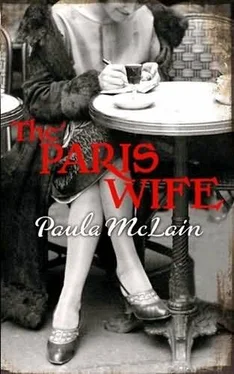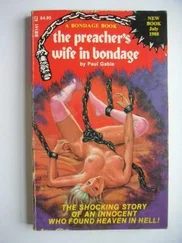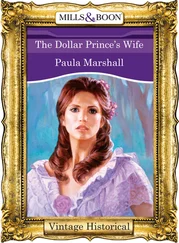He pulled me closer then. “Please don’t worry, just tell me you love me.”
“I love you,” I said, and kissed his hands and eyelids and tried to forget what he’d said. But I couldn’t. I couldn’t forget anything he’d ever said to me. That’s how it was.
“Go to sleep now.”
“All right,” I said.
He rose and dressed. It must have been three o’clock in the morning, or maybe four.
“You’re not going to work now?”
“Maybe not,” he said. “But I’m going to try.”
I heard him leave, his steps on the stairs, all the way down, and then fell asleep for a few hours. When I woke up he was still away working, and it was already hot and close in the apartment. I kicked the bedsheet away and put my robe on and went into the kitchen to make the coffee. Musicians from the night before were still in the street and it made me feel tired just to hear them. I didn’t know how they managed to keep playing. Did they sleep standing up in doorways? Did they sleep at all?
After breakfast, I washed and dressed and sat at the piano for a few hours, but it wasn’t satisfying work. The day was too hot and I was too distracted by the night before. I lay down again, and then heard Marie Cocotte in the kitchen, clearing dishes. We’d gotten her name from the concierge in our building, and now she came in every morning as our femme de ménage , taking care of all the washing and cooking for two francs an hour. Marie was childless and nearing middle age, petite and sturdy, with quick and competent hands. She’d earned her nickname, cocotte , which was French slang for “wench,” from a dish she made often and beautifully for us, poulet en cocotte . Several days a week, she returned in the late afternoon to prepare our dinner, and because she made everything so well, I’d asked her to teach me French cooking. But now that it was high summer, I didn’t want to be in the kitchen at all and was happy to eat fruit or nothing until Ernest was finished with his work. Then we’d go to a café for an aperitif when it was dark and much cooler and felt right again to eat and be hungry.
“Good morning, madame,” Marie Cocotte said, coming into the bedroom where the curtains were still open from the night before. We’d never closed them.
“Will the music ever stop?” I asked in my still-graceless French, pointing to the window.
“Not today,” she said, laughing.
“I think Bastille Day will last forever,” I said, and she laughed again.
“That is how we like it,” she said.
The summer stretched on this way, becoming several summers in a row, with time not moving at all. The days grew harder to fill. I felt my headaches coming back, and though I knew I shouldn’t resent Ernest’s working or try to keep him from it, I was always happiest when he woke up and said he wasn’t going to try to write at all that day, and that we should go to the boxing matches instead, or drive out to the country to see the bicycle races.
One afternoon Gertrude and Alice invited us to lunch at their country house in Meaux. We went out all together, in Gertrude’s Model T, and had a picnic feast with two kinds of eggs and potatoes and roast chicken. We drank several bottles of chilled wine and then three-star Hennessy, and everything was beautiful-the valleys and bridges, the charming house and its flowering trees. After lunch, we lay in the grass and talked and felt free.
Ernest had taken to showing Gertrude all of his work, and reading hers as well. Though he’d felt put off by the difficulty of her writing at the beginning of their friendship, he’d grown to appreciate the strangeness of it and was becoming more and more interested in what she was doing. She even began to influence his style, particularly the habit she had of naming and repeating concrete objects, places, and people, not trying to find variation, but reveling in how any word took on a striking power when you used it again and again. In some of the new Nick Adams passages, I saw how he was doing this, too, with the simplest language and things- lake, trout, log , boat -and how it gave the work a very distilled and almost mythic feel.
Ernest’s connection to Gertrude was obviously very important to them both, and I loved that we were all becoming good, easy friends with one another, though there was still a persistent pairing off when we met. Ernest and Gertrude were the artists, and when they talked, their heads close together, they seemed almost like siblings. Alice and I were the wives, even without the four walls of the salon to define us, and she seemed content with this. Was I? Ernest utterly supported my playing and often referred to the piano as my “work,” as if I were an artist, too. I loved to play and felt it was very much a part of my life, but I wasn’t at all convinced I was special, as Ernest was. He lived inside the creative sphere and I lived outside, and I didn’t know if anything would ever change that. Alice seemed to feel easier in her role as an artist’s wife, throwing herself wholly behind Gertrude’s ambition, but maybe she’d just been doing it longer and could hide her jealousy better. I gazed into my glass of brandy-at the kaleidoscope it made on the pale blanket, which was some kind of Irish wool. We were here together now, I told myself. Everything was lovely and fine. I should just know it and hold on to it and be happy. I would. I would try.
The next day we woke late and I still felt the Hennessy. Ernest must have been feeling it, too, because we weren’t even out of bed yet before he said, “The work won’t be any good at all today. I shouldn’t bother.”
“You could go and try anyway, just for a few hours,” I said, feeling a small sting because I didn’t mean it.
“No,” he said. “It won’t come to anything. I already know.”
We rose and had our breakfast, and then decided we would go out to Auteuil, to the horse races. It would be cooler out of the city. Marie Cocotte would pack a basket with sandwiches and wine, and then we’d get the racing forms and read them on the train. As soon as it was settled, I felt the pressure in my head leave, whooshing out quickly like a ghost being exorcised from a house. I felt guilty for how happy it made me not to share him-guilty and happy, all at the same time.
Ernest and I both loved Auteuil. We always went over the racing form together and then visited the paddocks to see the animals. I loved the deep smell of the horses and the track itself and the noises of the happy crowd taking its luck as it came. Ernest was fascinated by everything-the beautiful rippling of horse flesh, the stumpy-looking jockeys in their silks, the trainers standing at the rails and seeming to know something mysterious, the slang of the boys in the stable, and the smell of horse piss. We never had a lot to spend at the races, but we always had something, and it felt good to be out together in the sun. Ernest would spread his coat in the grass and we’d lunch there, and then I’d nap or just watch the clouds and wait for the next race. When we won, we had champagne, and sometimes when we lost, too, because we were happy to be there and be together, and what was money to us anyway? We never had enough to make a difference if we lost it.
That day, the favorite was a shiny dark beauty, a good jumper with a quick way. He had tight sharp lines on the jump, making you think you’d barely seen it at all. We didn’t bet on the favorite, but on another, lighter horse called Chèvre d’Or that was running a hundred and twenty to one. Sometimes we picked the horses together, after walking the paddock or standing at the rails and seeing how the horses moved and waiting for a feeling. Sometimes Ernest found someone he knew who’d give him a name or two, good odds. That day I followed my own hunches and found the horse myself. I could be lucky for us that way. It had happened before, and that day I felt sure it would happen again. Chèvre d’Or wasn’t quick and dark but moved like brandy in a glass. I watched his smooth legs and told Ernest he was the one.
Читать дальше












